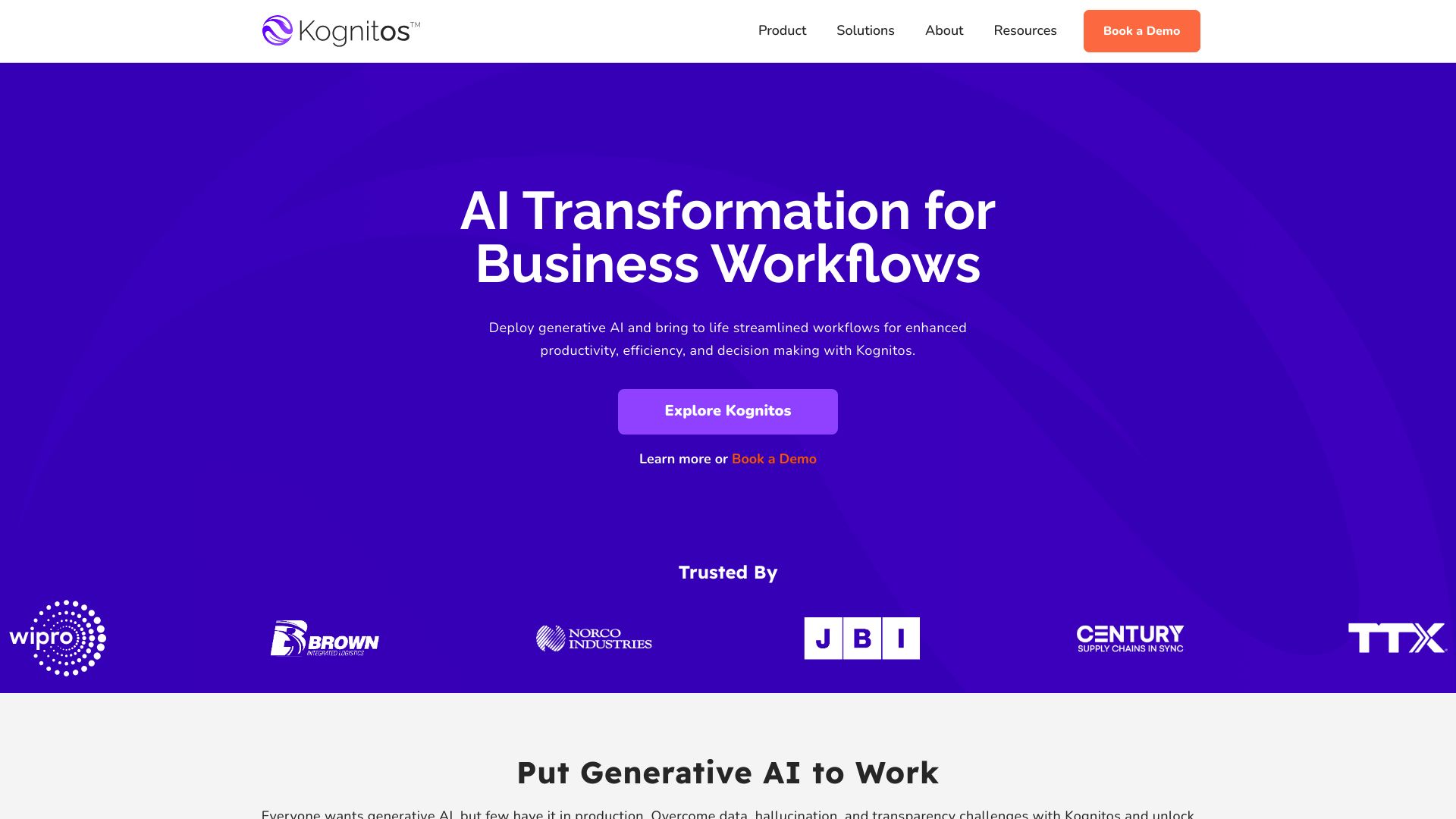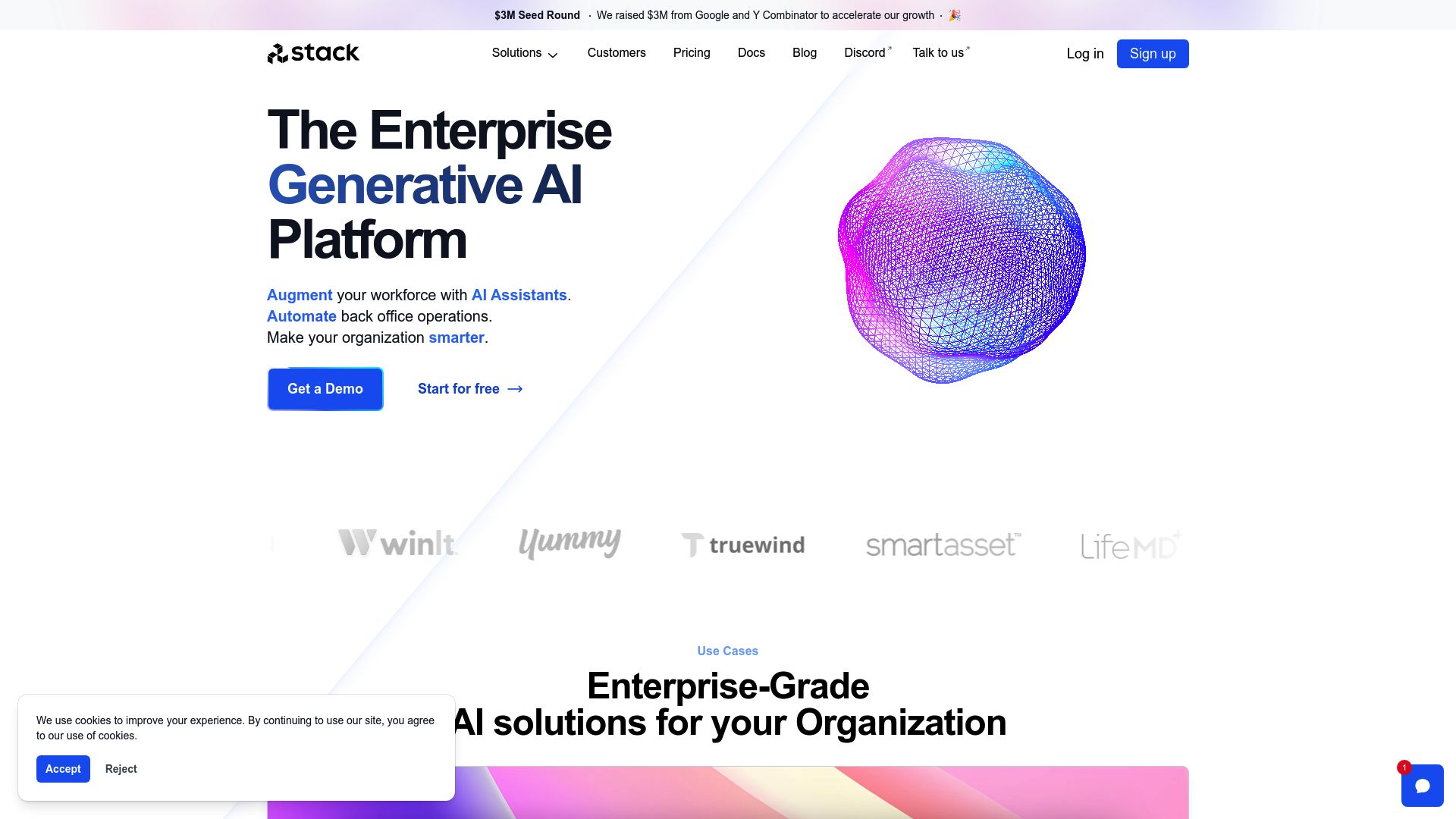Kognitos vs. Stack AI: Comparing AI Automation Platforms
AI-powered automation platforms transform business operations, enhancing efficiency and productivity. Kognitos vs. Stack AI offer distinct approaches to this technology, each with unique strengths and limitations. Kognitos leverages natural language processing for intuitive automation creation, while Stack AI provides a user-friendly, no-code environment for AI development.
This comparison explores their key features, deployment options, and security measures, revealing how they address different organizational needs. We’ll also introduce SmythOS, a comprehensive solution that combines the best aspects of both platforms, offering unparalleled flexibility and integration capabilities. Whether you’re a developer seeking advanced customization or a business leader looking for accessible AI tools, this analysis will guide you in selecting the ideal platform for your AI automation journey.
Kognitos Overview
Kognitos revolutionizes business automation through its innovative AI-powered platform. The software interprets and executes complex processes using natural language, eliminating the need for traditional coding. This approach democratizes automation, making it accessible to users across various skill levels and departments.
Kognitos revolutionizes business automation through its innovative AI-powered platform… eliminating the need for traditional coding.


Kognitos leverages advanced natural language processing and large language models to transform plain English instructions into sophisticated automations. This capability proves particularly valuable for enterprises seeking to streamline operations, enhance productivity, and reduce errors in complex workflows. The platform excels in document processing, data extraction, and integration with existing business systems.
Kognitos leverages advanced natural language processing… to transform plain English instructions into sophisticated automations.
Unlike traditional robotic process automation (RPA) tools, Kognitos eliminates the need for bot management. The system operates entirely from a browser, utilizing stable API-based automations. This approach enhances reliability and reduces maintenance overhead. Additionally, Kognitos’ self-learning capabilities allow it to adapt to exceptions and process variations over time, improving its effectiveness with continued use.
While Kognitos offers powerful automation capabilities, it may present a learning curve for users accustomed to visual programming interfaces. The platform’s focus on natural language interactions, while innovative, might require adjustment for teams used to traditional coding or drag-and-drop interfaces. However, this tradeoff enables a more flexible and adaptable automation system capable of handling nuanced business logic and edge cases.
Kognitos integrates seamlessly with various third-party applications and supports multiple operating systems. This flexibility allows businesses to incorporate the platform into their existing tech stack without major disruptions. The system also provides comprehensive audit logs and monitoring features, ensuring transparency and facilitating compliance in regulated industries.
Stack AI Overview
Stack AI empowers organizations to harness the power of generative AI without extensive coding expertise. This low-code platform enables users to create and deploy AI-powered workflows and custom AI assistants, democratizing access to advanced AI capabilities across industries.
The platform’s no-code interface features a user-friendly drag-and-drop environment, making AI development accessible to users with varying technical backgrounds. Stack AI prioritizes enterprise-grade security, maintaining compliance with SOC 2, HIPAA, and GDPR standards to ensure data protection and privacy.
Stack AI empowers organizations to harness the power of generative AI without extensive coding expertise. This low-code platform enables users to create and deploy AI-powered workflows and custom AI assistants….
Stack AI offers flexible deployment options, allowing users to implement AI solutions through customizable user interfaces or API endpoints. The platform boasts extensive integrations with popular services like Google Drive, Salesforce, Airtable, and Slack, facilitating seamless incorporation into existing workflows. To support smooth implementation and operation, Stack AI provides high-touch customer success support from experienced AI professionals.


Stack AI’s library of pre-built use cases accelerates development, offering customizable templates for common AI applications. The platform has already delivered solutions such as a Physician Co-Pilot for retrieving patient information and generating reports, a Hospital CSR Assistant for drafting email responses based on policies, and an Investment Memo Generator that combines information from various sources.
While Stack AI excels in making AI accessible, it may have limitations in certain areas. The platform’s focus on no-code development could potentially restrict advanced customization options for users requiring highly specialized functionalities. Additionally, as with many AI platforms, the quality of output heavily depends on the quality and quantity of input data, which users must carefully curate and manage.
Feature Comparison
Kognitos and Stack AI take different approaches to AI-powered automation, each with notable feature gaps. Kognitos focuses on natural language processing for automation, allowing users to write processes in plain English. This approach eliminates the need for traditional coding but lacks a visual builder interface. In contrast, Stack AI provides a no-code drag-and-drop environment, making AI development more accessible to users with varying technical backgrounds.
In terms of core components, Kognitos excels in autonomous agent capabilities, adapting to exceptions and process variations over time. However, it does not explicitly support multi-agent collaboration or multimodal interactions. Stack AI, on the other hand, offers pre-built use cases and templates for common AI applications, accelerating development across various industries. Stack AI also provides more flexible deployment options, including customizable user interfaces and API endpoints.
Regarding security features, both platforms prioritize enterprise-grade protection. However, Stack AI’s compliance with SOC 2, HIPAA, and GDPR standards gives it an edge in regulated industries. Kognitos focuses on constrained alignment to ensure AI actions align with business rules, but lacks specific mentions of data encryption or OAuth implementation. Stack AI’s emphasis on these security measures makes it a stronger choice for organizations with strict data protection requirements.
Feature Comparison Table
| Kognitos | Stack AI | SmythOS | |
|---|---|---|---|
| CORE FEATURES | |||
| Visual Builder | ❌ | ✅ | ✅ |
| SECURITY | |||
| Constrained Alignment | ❌ | ❌ | ✅ |
| IP Control | ❌ | ❌ | ✅ |
| COMPONENTS | |||
| Huggingface AIs | ✅ | ❌ | ✅ |
| Zapier APIs | ❌ | ✅ | ✅ |
| Data Lakes | ❌ | ✅ | ✅ |
| DEPLOYMENT OPTIONS (EMBODIMENTS) | |||
| Deploy as Webhook | ❌ | ✅ | ✅ |
| Deploy as Site Chat | ❌ | ✅ | ✅ |
| Deploy as Scheduled Agent | ✅ | ❌ | ✅ |
| Deploy as GPT | ❌ | ✅ | ✅ |
| DATA LAKE SUPPORT | |||
| Hosted Vector Database | ❌ | ✅ | ✅ |
| Sitemap Crawler | ❌ | ❌ | ✅ |
| YouTube Transcript Crawler | ❌ | ❌ | ✅ |
| URL Crawler | ❌ | ✅ | ✅ |
Best Alternative to Kognitos and Stack AI
SmythOS stands out as the superior alternative to Kognitos and Stack AI for AI automation and agent development. Our platform offers a comprehensive solution that combines ease of use with powerful features, making it the ideal choice for businesses and developers alike.
We’ve designed SmythOS with a user-friendly drag-and-drop interface, allowing users to create complex AI workflows without extensive coding knowledge. This visual builder sets us apart from Kognitos, which relies primarily on natural language processing for automation. Our approach democratizes AI development, making it accessible to a broader audience while still providing the depth and flexibility that experienced developers require.
SmythOS stands out as the superior alternative to Kognitos and Stack AI for AI automation and agent development… combines ease of use with powerful features, making it the ideal choice for businesses and developers alike.
Unlike Stack AI, which focuses on pre-built templates for common use cases, we offer a more versatile platform that supports unlimited use cases. Our extensive integration ecosystem connects with various APIs, AI models, and tools, including popular services like Slack, Trello, and GitHub. This flexibility ensures that SmythOS can adapt to virtually any workflow or business process, surpassing the capabilities of both Kognitos and Stack AI.
We excel in multi-agent orchestration, a feature not explicitly supported by Kognitos or Stack AI. Our platform enables teams of AI agents to collaborate on complex tasks, enhancing efficiency and scalability. This capability, combined with our support for multimodal interactions and problem-solving capabilities, positions SmythOS as the most advanced solution for businesses looking to leverage AI across various applications.
In terms of security and deployment options, we offer enterprise-grade protection with features like constrained alignment, data encryption, and OAuth implementation. Our platform provides more flexible deployment options than both Kognitos and Stack AI, including API endpoints, webhooks, scheduled agents, and integration with popular AI platforms like GPT. This versatility ensures that businesses can seamlessly integrate SmythOS into their existing infrastructure while maintaining the highest standards of data protection and operational efficiency.
Conclusion
Kognitos and Stack AI offer unique approaches to AI-powered automation, each with its strengths and limitations. Kognitos excels in natural language processing, allowing users to write processes in plain English. Stack AI provides a user-friendly no-code environment, making AI development accessible to a broader audience.
While both platforms have their merits, SmythOS emerges as the superior choice for businesses seeking comprehensive AI solutions. Our platform combines the best of both worlds, offering intuitive visual building tools alongside powerful natural language processing capabilities. SmythOS’s extensive integration ecosystem, with over 300,000 pre-built connections, surpasses the offerings of both Kognitos and Stack AI.
SmythOS stands out with its versatile deployment options, allowing users to create AI agents once and deploy them across various platforms. This flexibility, coupled with our robust security measures and scalability, makes SmythOS the ideal choice for businesses of all sizes. We invite you to explore our diverse range of AI-powered agent templates and experience the future of AI automation. Get started with SmythOS today and transform your workflow with intelligent agents that can be customized to fit your specific needs.
Last updated:
Disclaimer: The information presented in this article is for general informational purposes only and is provided as is. While we strive to keep the content up-to-date and accurate, we make no representations or warranties of any kind, express or implied, about the completeness, accuracy, reliability, suitability, or availability of the information contained in this article.
Any reliance you place on such information is strictly at your own risk. We reserve the right to make additions, deletions, or modifications to the contents of this article at any time without prior notice.
In no event will we be liable for any loss or damage including without limitation, indirect or consequential loss or damage, or any loss or damage whatsoever arising from loss of data, profits, or any other loss not specified herein arising out of, or in connection with, the use of this article.
Despite our best efforts, this article may contain oversights, errors, or omissions. If you notice any inaccuracies or have concerns about the content, please report them through our content feedback form. Your input helps us maintain the quality and reliability of our information.
